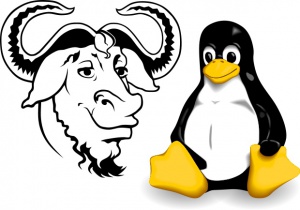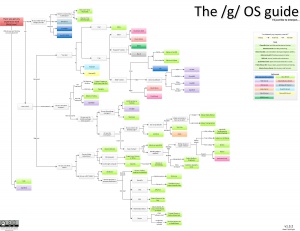We are still actively working on the spam issue.
Difference between revisions of "GNU/Linux"
(→Recommended distributions: added notification to non-FSF Mint) |
m (→Recommended distributions) |
||
| Line 25: | Line 25: | ||
[http://www.linuxmint.com/ Linux Mint (Ubuntu)] and [http://www.linuxmint.com/download_lmde.php Linux Mint Debian Edition]. Keep in mind that Linux Mint is non-FSF | [http://www.linuxmint.com/ Linux Mint (Ubuntu)] and [http://www.linuxmint.com/download_lmde.php Linux Mint Debian Edition]. Keep in mind that Linux Mint is non-FSF | ||
| + | |||
[http://origamios.oo3.co/ Origamo OS (Debian)] | [http://origamios.oo3.co/ Origamo OS (Debian)] | ||
Revision as of 21:56, 28 January 2014
This article needs to be improved.
Contents
Linux at its core is a kernel, the central driving force of an operating system that allocates resources to other aspects of the system. Linux, along with the GNU system (which is closely associated with Free Software Foundation) are now collectively referred to as GNU/Linux, and make up a complete operating system which is widely used today by millions across the world. To read more about the history of the GNU project and Linux, see this article.
Why use GNU/Linux?
The free software philosophy is about an open and shared operating system which not only free as in money, but free as in freedom. The GNU/Linux system gives users more control over their computing experience than competing operating systems such as Windows, which could contain malicious features to them without the user's knowledge.
What's all this about distributions?
There are a lot of GNU/Linux distributions, also known as distros.
Most distros are at least somewhat similar with each other. The main differences are between the init system, package manager (and the repositories it has access to), desktop environment, and default configurations. Most distros have their own little niche. Some are FSF compatible (or almost), for ricing, for getting shit done or just because you hate yourself or just love pain (arch/gentoo). Always at least try another distro before saying that you hate it. You will find that all of them have their own qualities. Distrowatch is a great place to find out more.
Recommended distributions
Easy to use and install
Debian-based
Linux Mint (Ubuntu) and Linux Mint Debian Edition. Keep in mind that Linux Mint is non-FSF
RHEL-based
Independent
Highly customizable (ricing)
Gentoo - Gentoo Linux Website (to the point of being a joke)
Debian GNU+Linux - Debian Website, Debian Live ISOs
GNU/Linux Naming Controversy
The GNU/Linux naming controversy is a dispute regarding whether or not to refer to the operating system commonly known as Linux as GNU/Linux. GNU/Linux was a term originally created by the Free Software Foundation to refer to the combination of the GNU corelibs and the Linux Kernel, which they argued to form a functioning operating system. The Free Software Foundation recommends the term GNU/Linux because it argues the GNU project was part of a project to develop an operating system, from which the kernel was the last piece to complete (see GNU HURD). The Free Software Foundation suggests that the inclusion of the term GNU in the operating system’s name would recognize their contribution and their free software ideals ("Free Software as a Social Movement". ZNet.). Richard M. Stallman writes:
Today tens of millions of users are using an operating system that was developed so they could have freedom—but they don't know this, because they think the system is Linux and that it was developed by a student 'just for fun'.
On the opposite side of the argument, Linux supporters argue that the contribution of the Free Software Foundation is minimal (for example, GNU components make up only 8% of Ubuntu). Eric S. Raymond writes:
Some people object that the name "Linux" should be used to refer only to the kernel, not the entire operating system. This claim is a proxy for an underlying territorial dispute; people who insist on the term GNU/Linux want the FSF to get most of the credit for Linux because [Stallman] and friends wrote many of its user-level tools. Neither this theory nor the term GNU/Linux has gained more than minority acceptance.
Linux proponents also argue that since the operating system is often referred to as Linux by the mainstream media and most users, that it should be used as such, as opposed to GNU/Linux.

